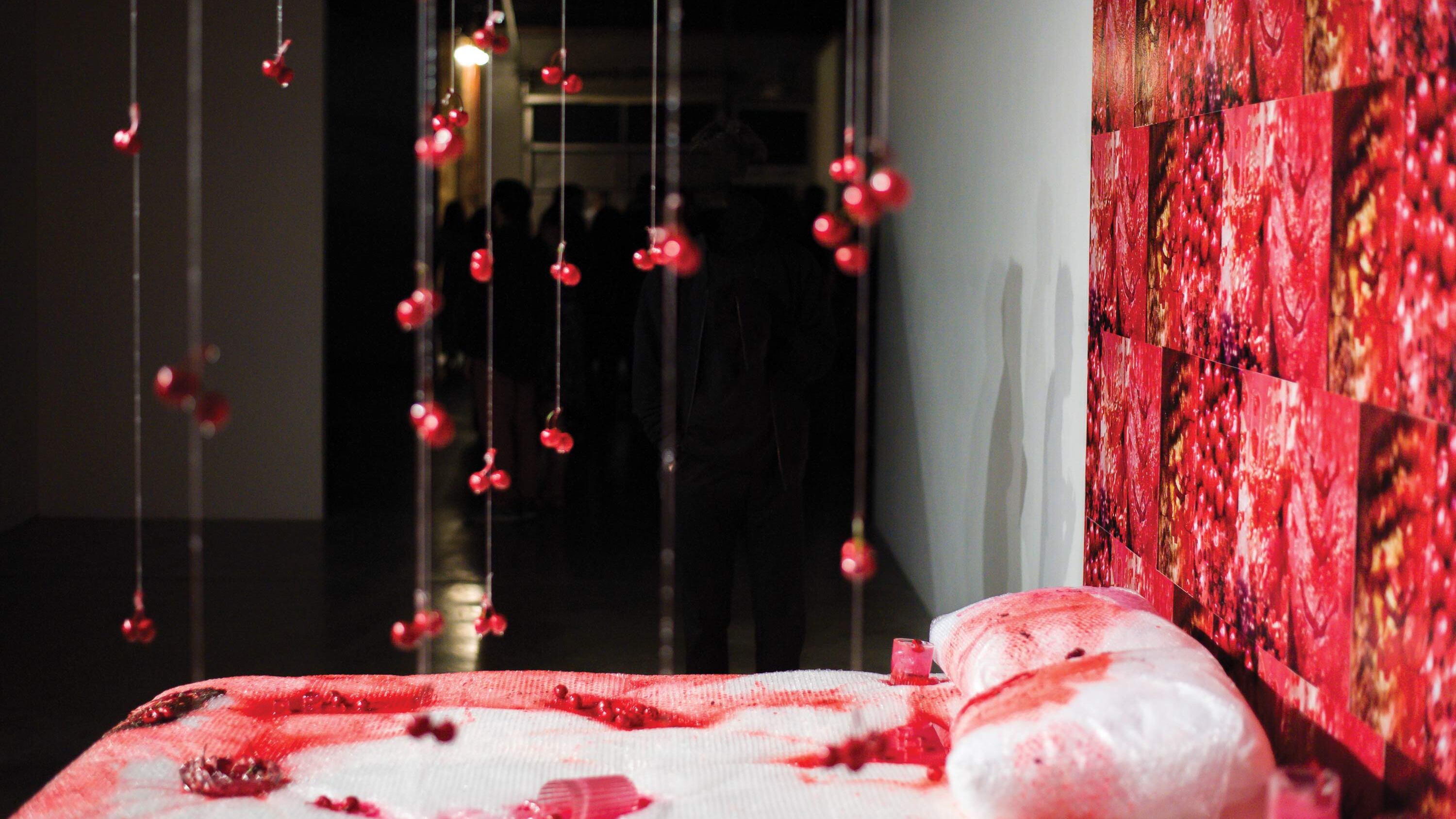Dakota Gearhart's installation is an entranceway to a demented world. We Are The Intimate Freaks You Asked For is the first work you encounter in Disjecta's new show, A Situation of Meat. Electrical wires coated in lumps of dingy-colored confetti hang from a rectangular frame, lining a thin walkway into the exhibit.
Standing inside the structure days before the show opens, curator Julia Greenway explains that it isn't completely finished. The TV hanging inside the hallway will play Gearhart's animation. Underneath the screen, there'll be an illuminated pool of liquid. "We're going to make it really milky and viscous," says Greenway, who's the director of Seattle's Interstitial gallery. "Like cum, breast milk, sort of like out-of-body liquid."
A Situation of Meat is the first of four shows that Greenway will create as Disjecta's curator in residence. Even partially finished, it's epic: five massive installations in the cavernous Kenton gallery. There's Virginia artist Braxton Congrove's collection of pink squiggly sculptures that vaguely resemble intestines, and yellow ovals that Greenway calls "eggs" but look more like pills: large, two-toned capsules nestled on a fluffy pink pillow. In And Don't Call Me Shirley, by Portland artist Maggie-Rose Condit, fake maraschino cherries are suspended over a king size bed that's soaked in goopy, red-tinted corn syrup.
"Grotesque" is a word Greenway frequently uses as she walks around the exhibit. But A Situation of Meat is not shock art—it's playful and even serene. Elizabeth Mputu's epigenetic therapy treatment is like a metaphysical healing workshop. Projected on a large wall, the video depicts pressure points and is narrated by a deep, slow-motion voice.
Greenway says she isn't interested in things that are uncommonly grotesque so much as the everyday grossness we choose to edit out of our lives. Especially with social media, she says, "You get to curate a self. I think it's important to be gross."
Mel Carter, one of the artists in the show, agrees. "There's more of a non-binary approach to femininity, that it can be more than just beautiful and dainty." All of the artists in A Situation of Meat are femme-identifying, but according to Carter, her interest in grossness is purely personal. "It's more just something we all gravitate towards. Like when you're talking to your best friend about some weird sex thing."
Carter's installation, desires as round as plums, is one of the most serene corners of the exhibit. Sectioned off by temporary white walls, a nine-minute video is projected above a pool of water. One part of the film is an underwater shot of chicken feet as they're dropped to the bottom of a tank. They almost look like thin human hands with wrinkled knuckles and pointy fingernails, until you notice the sliver of bone and tendon sticking out of the severed end. In a moment that's both funny and bizarrely fascinating, a foot hanging down from the top of the screen curls and uncurls its talens, scraping the pile of feet below it.
In another scene, two pink dahlias hang upside down from the top of the screen. You only realize that they're suspended in water when streams of milk are poured into the frame. It's beautiful and delicate, until the flowers start sloshing around, destroying the ribbons of white. The water becomes a gray, murky mess, and the flowers push against the glass container like frantic anemones.
It's tempting to see moments like that as a liberation from traditional femininity. The uninhibited yet subtle grossness of the entire show verges on cathartic. But A Situation of Meat is concerned with embracing the grotesque, not fetishizing it.
Besides, Greenway's primary interest as the show's curator wasn't really ideological. "All of these artists are the biggest weirdos," she says. "I wanted to see what they would look like in conversation together."
SEE IT: A Situation of Meat is at Disjecta, 8371 N Interstate Ave., disjecta.org. Noon-5 pm Friday-Sunday, through Oct. 29. Free.
